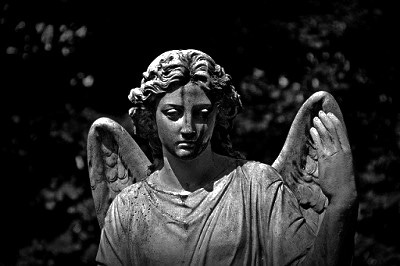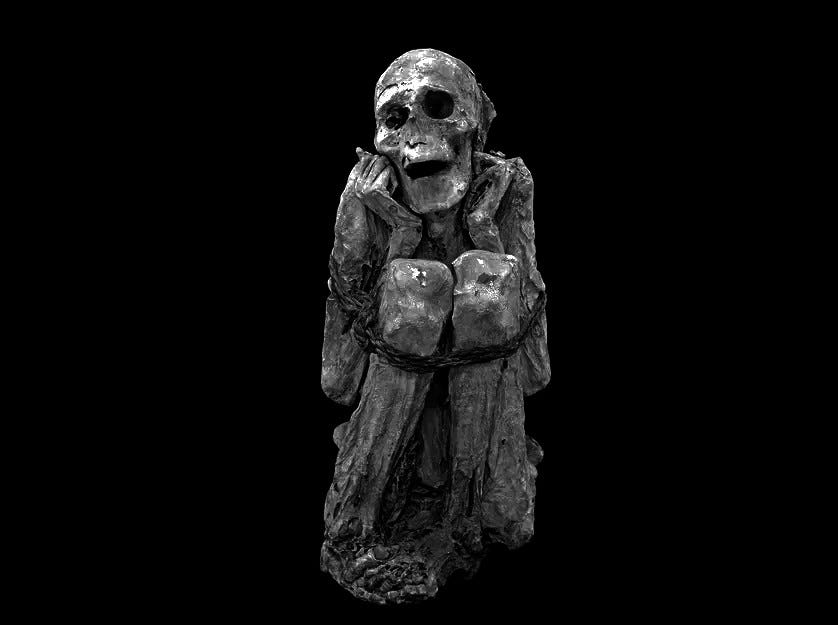Rilkean angels and interpretation
for another suckling imaginatory(tive) reading of Kafka, Rilke and Baudelaire
Before “reading”, please leave a comment.
The Kafka-Rilke-combo
As Kafka wrote of Strindberg, Rilke wrote of angels.
In 1915 Kafka started reading Strindberg’s Separated, and he wrote in his diary:
4 May. In A better state because I read Strindberg (separated). I don’t read him to read him, but rather to lie on His breast. He holds me on his left arm like a child. I sit there like a man On a statue. Ten times i almost slip off, but at the eleventh attempt i sit there firmly, feel secure, and have a wide view.
Around the same time Rilke wrote in the Duino Elegies:
Who, if i cried out, would hear me among the angels'
hierarchies? and even if one of them
pressed me Against his heart: i would Be consumed
in that Overwhelming existence. For beauty is Nothing
but the beginning Of terror, which we still are just able to endure,
and we are so awed because It serenely disdains
to annihilate us. Every angel Is terrifying.
I believe they wrote about the same thing: the subconsciously interpreted truth. Angels are messengers from another realm, they’re transcendental bringers of truth. Reading has the same purpose, as Kafka beautifully expresses. Reading a good book is like floating, like being a baby, and it’s not easy. You have to actively try to read it well, and when you do you fly. You finally receive transcendental messages and realize: Every angel Is terrifying.
It’s striking that both authors mention the chest. Kafka writes that he reads “to lie on His breast”, and Rilke writes that if an angel “pressed [him] Against his heart” he would “Be consumed in that Overwhelming existence”. To understand is to sit in the lap of an angel — but not only that. To understand is to be consumed, to assimilate, to capture (the truth of) the angel.
Baudelaire walks in to the room
Baudelaire wrote on perception and interpretation in a prose poem:
He who looks out at the world from an open window never sees as many things as he who looks at a closed window. There is nothing deeper, more mysterious, more fruitful, more shadowy, or more dazzling than a window lit by a candle. What we can see in daylight is always less interesting than what happens behind a windowpane. Deep in that dark or luminous aperture, life lives, life dreams, life suffers.
He seems to think that What window is more closed than a book? What book is more closed than a closed book? He continues:
Beyond the waves of rooftops, I glimpse a middle-aged woman, already wrinkled, poor; she is always bent over something, and never goes out. From her face, from her clothing, from her gestures, from almost nothing, I have remade this woman’s past, or rather, her story, which I tell myself from time to time in tears.
If it had been a poor, old man, I would have remade his story just as easily.
And then I go to sleep, proud of having lived and suffered as people other than myself.
The meanings of all phenomena you perceive, especially closed books, (which are the objects imbued
with the largest amount of potential meaning), are mind-dependent.
A good reading must therefore be based on hidden truths. And how do we sense these truths? Rilke told us: we capture Angels (which can only be sensed non-sensically).
We can capture these angels in several ways. One of the easiest ways is to conduct a Hypermetropic Vibrational induction, but there are other ways which I will expand on in future posts.
What happens when you finally manage (after perhaps years and years of deliberate training) to capture an angel? In the image above we can see an example, sadly I’ve not managed to find any more context than the caption provides. Personally I long for something similar to happen me, perhaps while I capture an angel of Tove Jansson or Emily Brontë.
What happens if you get stuck? If the angel captures you? Read about that in my last post about Dottore Giacomo Rossi and beautiful kvadra’s reply. (Disclaimer: I haven’t read their post in the usual sense, I’ve only divined it — mine and her theory might be entirely opposed to each other.)
So, why risk understanding? Rilke has the answer:
Every angel is terrifying.
And yet, alas, I invoke you,
almost deadly birds of the soul, knowing about you.
If you’re curious what Giordano Bruno would think about all of this, please subscribe to the newsletter!




leaving this comment as asked
i hope one day to be invoked as an angel of great terror and beauty